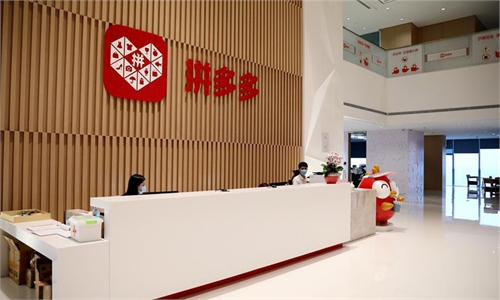23-year-old woman's death raises questions over tech sector’s ‘unhinged’ growth model

Pinduoduo Photo: CFP
The recent sudden death of a 23-year-old employee at China's e-commerce giant Pinduoduo continues to make waves in the public discourse in China.
Beyond the widespread condemnation of the popular overwork culture in the country's massive internet sector, questions have also been raised about the trend of internet companies relentlessly wading into traditional, less tech-savvy areas of the Chinese economy amid cutthroat competition.
The society-wide soul-searching online on the overwork culture at internet companies reflects a profound shift in the Chinese society's attitude toward labor rights as well as on the ascent of the Chinese economy toward a more advanced and competitive one, industry insiders and analysts said on Tuesday, calling for meaningful changes to balance profits and labor rights.
Troubling trend
Zhang, born in 1998 and an employee at Pinduoduo's community grocery business in Urumqi, capital city of Northwest China's Xinjiang Uygur Autonomous Region, collapsed suddenly while walking home around 1:30 am on December 29, 2020, and she later died at a hospital.
A post on social media about Zhang's death went viral, prompting harsh criticism of the tech companies' so-called "996" work culture - working from 9 am to 9 pm six days a week, an official investigation into the company's employment conditions and a plunge in the firm's US-listed shares.
But underneath the public outrage is a more troubling trend - internet companies' relentless pursuit of new businesses in every corner of the Chinese economy. Pinduoduo's community grocery business, or community group buying, where Zhang worked, is the latest battleground among Chinese internet giants.
Community group buying is a business model that allows residents in one community to buy groceries in bulk at a big discount. The approach is popular over the past years among residents and farmers because of the convenient services and lower costs. However, when all the internet companies, including Pinduoduo, Alibaba, Tencent and JD.com Inc, smelled the massive potential and stepped in, it became a problematic business with price wars, monopolistic practices, damage to small vendors and the jobs market.
"The business model is very simple; it basically connects consumers directly with farmers. There is virtually no technological innovation involved," Liu Dingding, a Beijing-based internet industry analyst, told the Global Times on Tuesday. "It is a good model. The problem is how the internet companies approached it."
With the internet companies fighting for market share, they spend massive amounts on subsidies, leading to almost zero-cost food delivered to homes, including 0.1 yuan ($0.0154) for an egg with delivering fees included. However, the catch is that once consumers purchase the cheap goods initially, they would stay with the same platform. Also, with the price war, small vendors would be pushed out and jobs could be compromised.
Such questionable practices have already been adopted by internet companies in several areas, including ride hailing, bike sharing and food delivery. They have also caught the attention of Chinese market regulators. In December 2020, the State Administration for Market Regulation summoned representatives of Alibaba, Tecent, Pinduoduo and other companies to discuss oversight of group buying. Official media outlets, including the influential People's Daily, have also criticized internet companies for earning quick cash through such a model rather than technological innovation.
Beyond the market distortion, overtime work in the new business model is also a common practice. "When many people talk about the '996' work schedule for programmers, they don't know that many low-level workers at internet companies also have the same work hours, if not more," a worker for the group-buying unit of one of the largest internet firms in Beijing told the Global Times on Tuesday.
Because vegetables are usually delivered in the morning, many platform workers have to work overnight to ensure the process goes smoothly, according to the worker, who spoke on condition of anonymity. "We are not highly-educated workers who earn high salaries, we are just low-income workers like a food deliverer," the workers said.
Deliverers for food-ordering platforms such as Meituan have also revealed their tough work schedules and requirements. A recent article chronicling how a food deliverer was trapped in the platforms, whose powerful computing capabilities offered precise and strict deadlines for the food to be delivered, caused trouble, further shedding light on the hardship experienced by low-end workers of the country's advanced internet companies.
However, internet insiders say the root cause is the cutthroat competition in China's internet sector, as they face a more mature industry after years of rapid growth. For the companies, it's a fight to the death, some executives said.
Pindoduo, which is a rising star in the internet sector, has been trying to break the advance and expansion of similar internet platforms. "But in order to catch up with other giants, what we can do now is to lay a solid foundation, most of which still depends on improving efficiency," Daisy Liu, a Pinduoduo senior executive, told the Global Times on Tuesday. Liu prefers to use Daisy instead of her real given name.
"Such a work culture is difficult to change in a short period of time," Daisy Liu said, adding that the company offers above-market salaries, but also expects their staff to be mentally prepared and professionally competent for high-intensity work.
Calls for change
However, the fundamental issue is not the fierce competition but the struggle for the companies to balance their endless pursuit of profits that has been likened to unhinged growth of small coal mining firms years ago with shifting market and social tides, experts noted.
"The internet companies focus on grabbing the next business opportunity with the fastest speed and a lot of capital. They are still used to the unhinged growth seen in the past, but what they need to do is to come up with a mechanism to ensure labor rights and other issues that are gaining more and more attention," Liu Dingding said, adding that while they could get away with that a few years ago, they now face problems.
From widespread criticism of the "996" culture for programmers and computer engineers at the internet companies to public outcry following the death of 23-year-old Zhang at the lower end of the corporate ladder, the shift also underscored the series of problems caused by the transition at internet companies from building platforms to competing for business ecosystems, analysts pointed out.
The rapid growth in China's digital economy as well as the issues it brought along also highlighted an inventible test for the country going forward, as it seeks to balance steady economic development and other modern governance priorities.
Achieving such a balance has already become a top priority for Chinese policymakers. At the Central Economic Work Conference held in early December 2020, top officials listed strengthening anti-monopoly regulations and preventing disorderly capital expansion as a top priority this year.
Within the internet companies and on social media, there are growing calls for changes that could ensure both economic development and labor rights.
On Weibo, a commentary from China Media Group that calls for the end to "trading life for money" has gained 450 million views and over 30,000 comments as of press time.
In a survey of 81,000 people on professional social media platform Maimai, 89 percent said that they are against overtime work, highlighting the growing awareness and pursuit for labor rights in Chinese society.
Some internet employees said that while they understand that working overtime is occasionally required, they want to drop the exhaustive '996' and other abnormal work schedules and they are calling for tighter regulations and enforcement of labor laws from regulators.
"I feel great pressure at work. My heart is uncomfortable and my hands shake occasionally… My biggest wish is to enjoy two days off every week," a 30-year-old programmer surnamed Chen who works in ByteDance in Beijing, told the Global Times on Tuesday.
"With the rapid development of the internet industry and fierce competition, it is difficult to change the overtime work status of grass-roots employees by relying on industry self-discipline. We can only hope for national regulators," added Yang Le (pseudonym), a back-end developer at a top Chinese internet company based in Shenzhen, South China's Guangdong Province.
Liu Dingding said that while the culture might take some time to change, the latest signals from top Chinese officials "should definitely sound the alarm for the internet companies."



